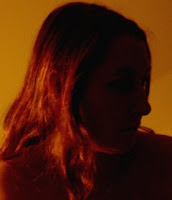BIZARRE HUMAN CUSTOM: Hallowe'en
All growing up parents have told you "don't talk to strangers", don't go to people's houses that you don't know and don't eat too much junk food. On planet Earth they are supposed to break all these rules all in one night.
On this night people groom themselves in very different ways. Some wearing costumes of a frightful nature, while others have costumes bearing a sexual fantasy. Often these costumes are for adolescents and upwards. The night is really for the children, or 'ghosts' and 'goblins' as one poem as which refered them. Adults get jealous of this initiation period and wish that they could attend Costume or Hallowe'en parties.
Our anthropologists have studied the customary ritual of Hallowe'en night and one thoery suggests that this culture was very uncomfortable being in their own skin and thus dawned masks and costumes to show their true selves.

 We have found one preserved costume this period. It was a black hood with a white faced scream as picture to the left. Since this is very much similar to the famous artwork of 'The Scream", we can determine that this culture was very much interested in artwork and had gret respect for the artist.
We have found one preserved costume this period. It was a black hood with a white faced scream as picture to the left. Since this is very much similar to the famous artwork of 'The Scream", we can determine that this culture was very much interested in artwork and had gret respect for the artist.
The mantra that is repeated by the children all night long "trick or treat". Our scientists are analyzing if this was a ritual inititive done to all children each year. If one passed the initiation, they were given a treat. They were to test themselves numerous times that evening perhaps attending 50 or 100 houses. What they were testing themselves for, however, has yet to be determined. Children often desired to go to the bigger homes in their city in order to receive, what they thought would be a tougher initiation but with more rewards. At such a young age they were calculated the risks. This was a smart culture, who taught their children well.
Once the children return to the safe places of their homes they took part in one last ritual which was what we have determined to be called "the trade". This word has many connotations in the English language, but our anthropologists are confident they will determine what it all means.
On this night people groom themselves in very different ways. Some wearing costumes of a frightful nature, while others have costumes bearing a sexual fantasy. Often these costumes are for adolescents and upwards. The night is really for the children, or 'ghosts' and 'goblins' as one poem as which refered them. Adults get jealous of this initiation period and wish that they could attend Costume or Hallowe'en parties.
Our anthropologists have studied the customary ritual of Hallowe'en night and one thoery suggests that this culture was very uncomfortable being in their own skin and thus dawned masks and costumes to show their true selves.

 We have found one preserved costume this period. It was a black hood with a white faced scream as picture to the left. Since this is very much similar to the famous artwork of 'The Scream", we can determine that this culture was very much interested in artwork and had gret respect for the artist.
We have found one preserved costume this period. It was a black hood with a white faced scream as picture to the left. Since this is very much similar to the famous artwork of 'The Scream", we can determine that this culture was very much interested in artwork and had gret respect for the artist.The mantra that is repeated by the children all night long "trick or treat". Our scientists are analyzing if this was a ritual inititive done to all children each year. If one passed the initiation, they were given a treat. They were to test themselves numerous times that evening perhaps attending 50 or 100 houses. What they were testing themselves for, however, has yet to be determined. Children often desired to go to the bigger homes in their city in order to receive, what they thought would be a tougher initiation but with more rewards. At such a young age they were calculated the risks. This was a smart culture, who taught their children well.
Once the children return to the safe places of their homes they took part in one last ritual which was what we have determined to be called "the trade". This word has many connotations in the English language, but our anthropologists are confident they will determine what it all means.



0 Comments:
Post a Comment
<< Home